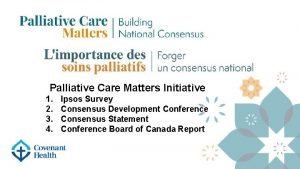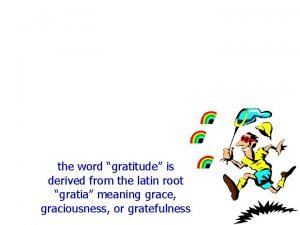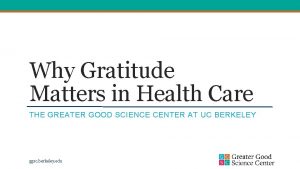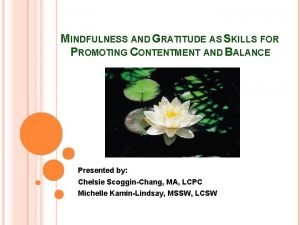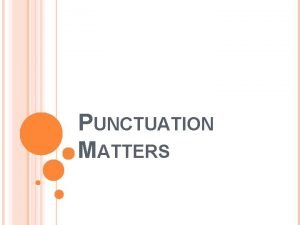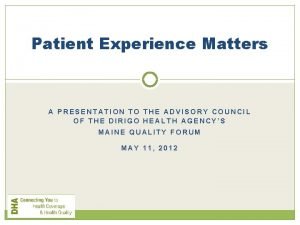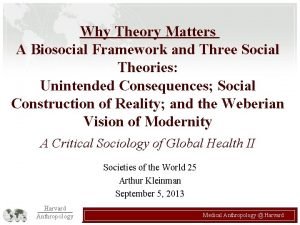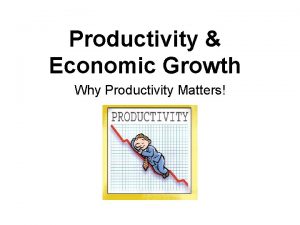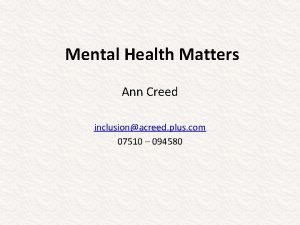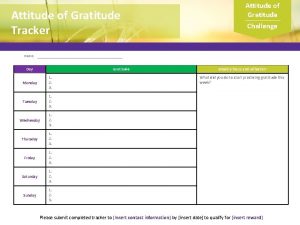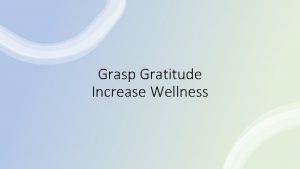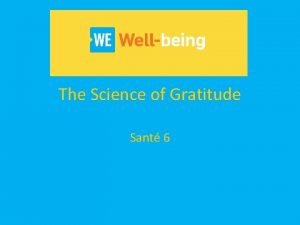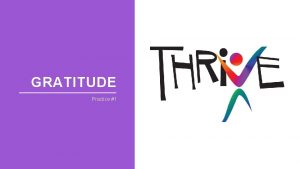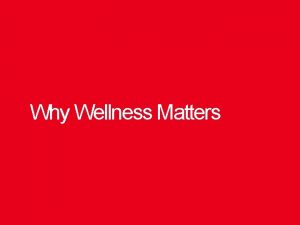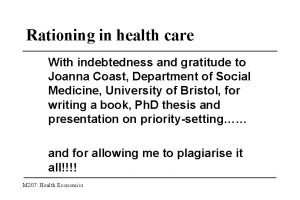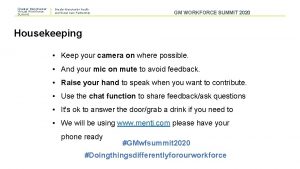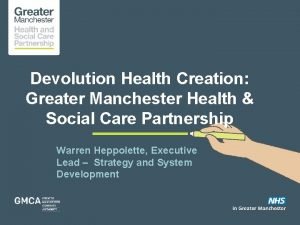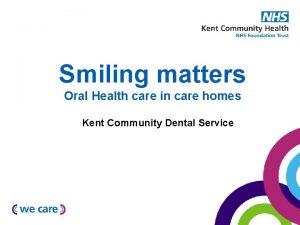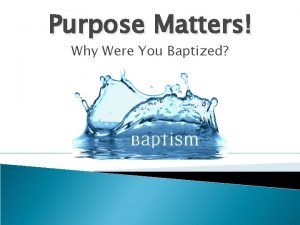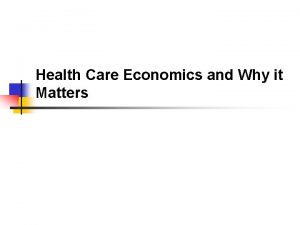Why Gratitude Matters in Health Care THE GREATER
























- Slides: 24

Why Gratitude Matters in Health Care THE GREATER GOOD SCIENCE CENTER AT UC BERKELEY ggsc. berkeley. edu

What is Gratitude? A recognition that… ◦ There’s goodness in our lives, gifts or benefits that we enjoy (and might often take for granted). ◦ This goodness is often due to the actions of another person. When we’re grateful, we recognize the intention and effort that went into those actions on our behalf, and the benefits they gave us. (Emmons, 2003 & 2007)

How Can Gratitude Help Us? Over the past two decades, studies have consistently identified strong benefits of gratitude for our minds, bodies, and relationships. ◦ ◦ ◦ Gratefulness increases happiness and life satisfaction. Grateful people are more resilient to stress. Grateful people get along better with others. Grateful people are less depressed. Grateful people achieve more. Grateful people are more helpful and generous.

Gratitude Motivates Gratitude motivates people to make positive changes in their lives and in the world around them through feelings of: ◦ CONNECTEDNESS: Gratitude rewards us with a strong network of support and encouragement, leading us to feel that we are capable of tackling big challenges. ◦ ELEVATION: Gratitude helps us feel inspired and uplifted, motivating us to become healthier & more generous people and better & more productive workers. ◦ HUMILITY: Expressing gratitude forces us to recognize that our successes are due, at least in part, to the actions of others. ◦ INDEBTEDNESS: Gratitude encourages us to recognize and reciprocate the good that others have given us, thus ridding ourselves of psychological debts we carry.

Gratitude in Health Care Settings HOW GRATITUDE SUPPORTS THE HEALTH OF PROVIDERS AND PATIENTS

Why Gratitude in Health Care? “Gratitude is a vaccine, an antitoxin, and an antiseptic. ” ~ John Henry Jowett, 1863– 1923

Gratitude and Health Improves ◦ ◦ ◦ Sleep Tendency to exercise Cardiovascular health Adherence to medication Mood, optimism, hope Reduces ◦ ◦ ◦ ◦ Substance abuse Fat intake Cortisol Blood pressure Suicidal thoughts Inflammation Perceived stress and depression in health care providers

Gratitude Helps Patients Study by Wong, Owen, Gabana & Gilman (2015): Adults & college students receiving mental health counseling (for depression/anxiety) were given these additional therapies: ◦ Group 1: Write 1 letter of gratitude to another person weekly for 3 weeks ◦ Group 2: Write about their deepest thoughts and feelings about stressful experiences ◦ Group 3: No writing activity RESULTS: ◦ Group 1 reported significantly better mental health than the other groups 1 month after the writing exercise ended, then again 3 months after

Gratitude Helps Patients Study by Redwine et. al. (2016): Patients with Stage B heart failure were studied: ◦ Took blood samples ◦ Measured heart rates ◦ 50% of study participants kept a daily gratitude journal RESULTS: ◦ Those who kept gratitude journals showed fewer biological signs that their heart disease was getting worse ◦ Showed healthier resting heart rate while journaling in the lab

Gratitude Helps Patients Study by Huffman et al (2016): Participants who had a recent acute coronary event were asked to: ◦ Report on their levels of gratitude right afterwards, and 3 & 6 months later ◦ Keep track of physical activity with step counters RESULTS: ◦ Those who felt more grateful after their heart problems engaged in more healthy behaviors and reported better quality of life.

Gratitude Helps Patients Study by Huffman et al (2014): Patients with psychiatric problems were given 1 of 9 positive psychological exercises to do over 8 weeks, including writing a gratitude letter and counting blessings. RESULTS: ◦ Patients reported less anxiety and depression than those who received standard treatments. ◦ Patients reported the greatest benefit from the gratitude exercises, especially the gratitude letter.

Gratitude in the Workplace Surveys have found that: ◦ People are less likely to express thanks at work than anyplace else ◦ 60% NEVER or very rarely thanked anyone at work ◦ Only 10% expressed gratitude at work on a given day ◦ 35% worried that expressing gratitude would lead co-workers to take advantage of them

Gratitude in the Workplace Yet surveys also show that: ◦ Saying “thanks” at work makes people feel happier and hearing “thanks” made them happier and more productive (by 50%!) ◦ Only 18% felt expressing gratitude made bosses seem weak; 93% said grateful bosses were more likely to succeed ◦ In general, “Thank you” from a supervisor boosts self-worth and self-efficacy; gratitude recipients become more trusting and more helpful ◦ According to the U. S. Department of Labor, the number one reason why people leave their jobs is because they don’t feel appreciated.

Gratitude and Health Care Providers 43% of nurses and more than half of physicians say they have struggled with BURNOUT. Burnout is a complex state of being, generally defined by: ◦ Emotional exhaustion ◦ cynicism and callous attitudes towards others ◦ a reduced ability to be effective in our jobs and relationships.

Gratitude Helps Health Care Providers Study by Cheng, Tsui & Lam (2015): Health care providers twice weekly wrote down things for which they were grateful. RESULTS: ◦ Reductions in perceived stress (28%) and depression (16%) in health care practitioners ◦ “Such positive effects can also lead to an improvement in both productivity and quality of patient services. ”

Building a Culture of Gratitude LESSONS LEARNED FROM HEALTH CARE PARTNERS

Building a Culture of Gratitude HARDWIRING GRATITUDE Efforts to foster gratitude are most effective when they are baked into organizational culture, supporting individual practice while working toward systemic change.

Building a Culture of Gratitude VOLUNTARY PARTICIPATION Expressions of gratitude and gratitude programs as a whole should not be forced on employees. Rather, gratitude needs to be fostered in a way that respects staff time.

Building a Culture of Gratitude MAINTAINING AUTHENTICITY Gratitude should be a practice that is encouraged and allowed to grow organically.

Building a Culture of Gratitude MAKING GRATITUDE A YEAR-ROUND ACTIVITY Gratitude will thrive when it’s not just done as part of discrete programs or at certain times of the year but is connected to other, year-round efforts to foster a positive, caring culture.

Building a Culture of Gratitude BUILDING A RESILIENCE TOOLKIT Mindfulness techniques, training caregivers in the art of compassion, and engaging in campaigns to encourage kindness are all practices that, together with gratitude, offer an array of tools that staff can use.

Want to Practice More Gratitude? TRY THESE! Find more at: • ggia. berkeley. edu

How it works: Want to Practice More Gratitude? TRY THIS! Register at: • Thnx 4. org o Register for a 10 -Day Intensive or 21 - Day Gratitude Challenge o Receive a friendly, informative ping from Thnx 4 daily or every other day inviting you to journal and share your gratitude and rate your day-to-day feelings. o Throughout the challenge, your Thnx 4 Insights page shows you how you typically use gratitude and the overall impact of your Gratitude Challenge. o Enjoy the benefits of strengthening gratitude with Thnx 4.

Thank You! VISIT greatergood. berkeley. edu FOR MORE GREAT RESOURCES
 Greater manchester health and social care partnership
Greater manchester health and social care partnership Andreas carlsson bye bye bye
Andreas carlsson bye bye bye Care matters nationwide
Care matters nationwide Sarah russell aged care
Sarah russell aged care Palliative care matters
Palliative care matters Primary secondary tertiary health care
Primary secondary tertiary health care Gratitude circle
Gratitude circle Far side spider slide
Far side spider slide Dedication of gratitude
Dedication of gratitude Showing gratitude at work
Showing gratitude at work Foonberg client gratitude curve
Foonberg client gratitude curve Spartan theme
Spartan theme Practice gratitude
Practice gratitude Why punctuation is important
Why punctuation is important Why productivity matters
Why productivity matters Waste container lid
Waste container lid Why was every child matters scrapped
Why was every child matters scrapped Why patient experience matters
Why patient experience matters Closing the word gap
Closing the word gap Why theory matters
Why theory matters Why data governance matters
Why data governance matters Why productivity matters
Why productivity matters Why motivation matters
Why motivation matters Masonic civility
Masonic civility Health matters paragraph
Health matters paragraph




